2014-11-23
【Aiden in English】 Moonlight reflects off the front of my bed.
Could it be frost on the ground instead? I look up to view the bright moon ahead. Thoughts of my hometown bring down my head. - Tang Dynasty Poet LI Bai (701-762 AD): In the Quiet Night
Although I am Chinese, I have limited knowledge of classical Chinese poetry. I haven't seen it in my life, either. This aspect of Chinese culture had eluded me until today, when the first poetry contest took place at Guanghua Chinese School in PA, which Principal Heng and her team organized. Mom volunteered to take pictures of the events as usual. On the other hand, I was going to spectate while she hopped around with her busy camera. Yet, didn't expect to see more than 30 people of all ages, including parents and relatives, participate in the 100-poem competition. Some kids, like Enya Su and Clare Chen, looked as young as five from kindergarten and could barely read Chinese. However, Enya fluently recited the Tang Dynasty poems and the Song Dynasty verses without hesitation. The competitions were defined as preliminary, semi-final, and final rounds. All participants were divided into three different groups based on their ages: the children's group, from 5 to 10 years old; the kids' group, from 11 years old and up; and the adults/parents group. There were various problems in each round. Sometimes, the participants had to say an entire poem. Another time, each of them must fill in the blank or look at a picture and name the poem. Each participant was asked these fundamental questions. If the participant doesn't know the answer, they could seek help from the Audience once. If an answer were incorrect, the opponents would get a shot to steal. A correct answer was worth 10 points, while a steal was worth five points. And to end each round, there was a set of buzz questions for everyone. After the buzz questions had been asked, the first person who hit the buzzer in front of them got to answer the question. What I found interesting was that every kind of contest like this, such as the famous TV game show "Jeopardy" and "Who Wants to Be a Millionaire", always had one brilliant person who got all the points. There was no difference in the poetry contest. One kid, called Andy Wang, dominated the match. It seemed as if others didn't even try hard. He brutally beat his opponents. In the end, he just rubbed it straight. The questions got more arduous as the final approached, and the contest became tougher. The competitors had determination in their eyes. But when the contest began, it vanished quickly. Just like in the previous rounds, Kevin Liu had studied in China up to the fifth grade and stood on top of the hill. He grasped the answers promptly throughout and outperformed any other competitors. Comparing his performance with the rest, Kevin looked like a Godzilla destroying a city if others tried to toss their toys around. The final score for the poetry contest was 160, 55, 50.5, 45, and 41 (something like that). Kevin won the title. I think the winner is self-explanatory. Kevin was congratulated for crushing the spirits of other children. Maybe next year we'll have more people get involved in Chinese classic poetry, and at least someone can step out and challenge them. Four judges successfully directed the poetry contest. Lin Fang, a graduate of Psychology from Peking Univ., used to be a well-known host on CCTV; Yue Zhang, a graduate of Physics from Fudan Univ., acquitted Chinese literature and history; Ling Zhang, a graduate of Broadcasting & Hosting Arts from the Communication University of China, was a professional host in Wenzhou TV; Wei Sun, a graduate of Chinese Literature from Beijing Normal Univ., is an outstanding teacher at a prestigious high school in Beijing. The event couldn't have been without our host, Liwen Guo, who has hosted the Chinese Gala at GHCS and the Greater Philadelphia Area for years. The sun beyond the mountains glows; The Yellow River flows seawards You can enjoy a grander sight By climbing to a greater height. - Tang Dynasty Poet WANG Zhihuan (688-742 AD): On the Stork Tower 【红霞译文】
床前明月光, 疑是地上霜。 举头望明月, 低头思故乡。 —唐代诗人李白(公元701-762)﹕《静夜思》 身为中国人,其实我对琅琅上口的中国古典诗词一点都不了解,中国古典诗词从未走进自己的生活中来,是个地地道道的门外汉,直到今天亲眼目睹由宾州光华中文学校游恒校长及其团队组织举行的首届“光华好诗词竞赛”,我才恍然大悟。妈妈依然拎着她那闲半勤的相机,随时捕捉各种动人场面,而我则远坐一旁静观赛事经纬。
没想到来自全校各年级包括父母亲友在内的卅多人竞相参加了这次100首唐诗宋词吟诵活动,年龄最小的苏恩雅和陈昕然仅有五岁,方块汉字认不了多少,但背诵起经典诗词,一点看不出是今年秋季刚入学前班的新生,尤其恩雅对唐诗宋词毫不含糊。
“光华好诗词竞赛”分别进行初赛、复赛、和决赛﹔根据年龄大小,所有参赛选手被划为三组﹕儿童组(5~10岁)、少年组(11岁以上)以及成人组﹔比赛题目有抽签背诗、看图吟诗、填空组诗、选择填诗、抢答咏诗等多种类型。每人允许有一次向观众求助的机会,答对的加10分,答错的不扣分﹔然而一旦答错,本组其他对手便有“偷抢”答题的可能。如果答对了“偷”来的题目,那么他或她意外地多得5分。每一轮结束前,选手们还要完成一连串抢答题,谁先争夺抢答权,谁就占有得分的优势。有趣的是,正如美国著名电视智力竞赛节目《危险边缘》和《谁想成为百万富翁》出现的状况一样,总有一位表现超常、了不起、真正聪明的大拿包揽该赢的积分,这次“光华好诗词竞赛”也不例外,名叫王亦鸣的小朋友力压群雄,丝毫不给对手半点后路,大家拿他一点办法也没有,只好望洋兴叹。 随着决赛拉开序幕,应对的题目越来越难,赛场的气氛也变得越来越紧张。上场前,选手们虽余勇可贾,可临阵时仍免不了感到心有余而力不足。不独有偶,曾经在国内学习过五年中文的刘凯文出类拔萃,力排各路精兵强将,如果说其他赢家充其量小打小闹,那么凯文却像哥斯拉摧毁城市一般强悍无比。比赛结果﹕160—55—50.5—55—45—41(大概齐吧),凯文以绝对优势勇夺本次比赛“诗词状元”的光荣称号。 本届冠军遥遥领先,凯文赢就赢在扎实的功底,期待来年会有更多的古典诗词爱好者涌现出来,届时至少有人敢站出来勇于挑战凯文。
负责定夺“光华好诗词竞赛”的四位评审员一向非常热衷蕴藏在我们传统文化当中的国粹精华,方林和章玲先后毕业于北京大学心理学系和中国传媒大学播音系,出国前曾经分别在央视和温州电视台担任过节目主播;张月毕业于复旦大学物理系,不仅熟谙中国古代历史,而且赋诗赋咏无所不及;孙伟毕业于北京师范大学中文系,就职于著名的北京四中学教授高中部语文,目前借助到美进行学术交流之际,莅临本校“光华好诗词竞赛”与其他三位评委共同担任“大学士”一职,现场讲解诗词要素。当然,整个比赛之所以进行得如此成功,离不开主持人郭荔文的专业功底,这位毕业于天津大学化工系的靓丽美眉近年来一直活跃在光华中文学校和大费城地区艺术舞台上。
白日依山尽, 黄河入海流。 欲穷千里目, 更上一层楼。 —唐代诗人王之涣(公元688-742)﹕《登鹳雀楼》 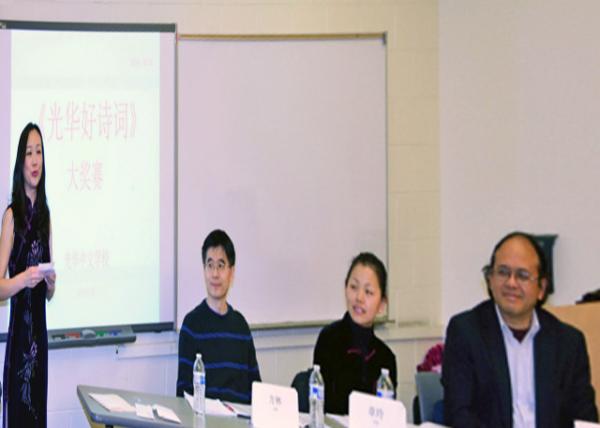 Poetry Contest @ Guanghua Chinese School Poetry Contest @ Guanghua Chinese School
(光华好诗词竞赛) 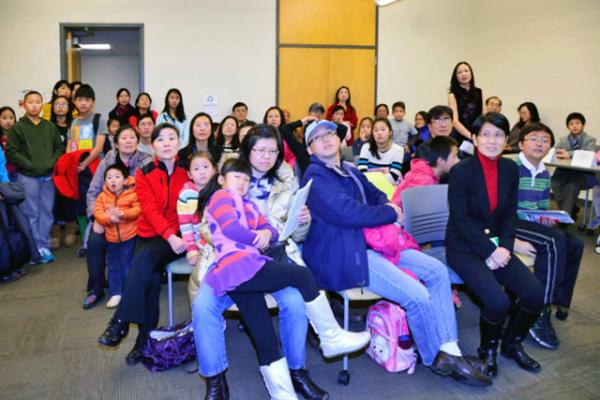 Audiencence (观众席 11-16-2014) Audiencence (观众席 11-16-2014)
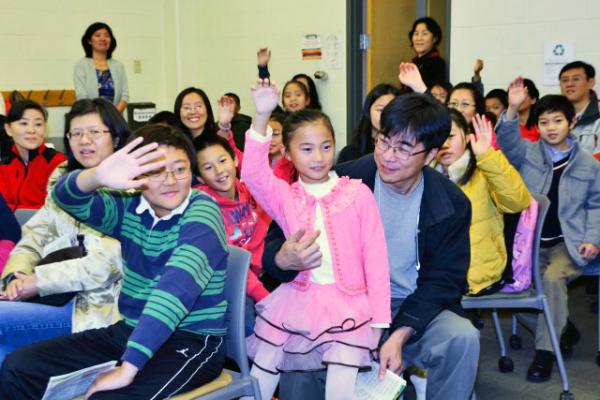 Quick Answerr (抢答题) Quick Answerr (抢答题)
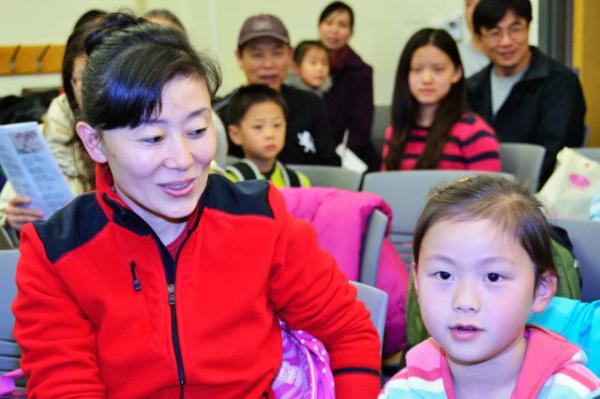 One of the Youngest Participants One of the Youngest Participants
(最小的参赛者之一) 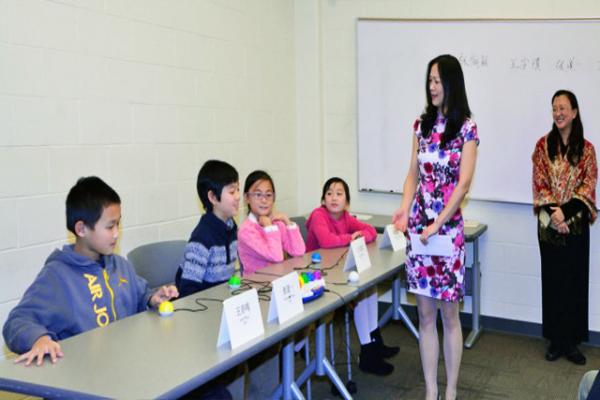 Final Round (决赛) Final Round (决赛)
Crosslink(相关博文): 6th Grade(初中一年级) |
